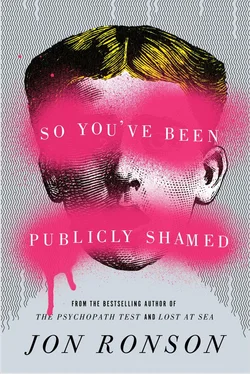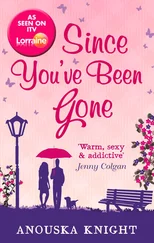“Hundreds of thousands?” I said.
“Her situation is very dire,” he said.
“Why does it cost so much?” I asked him.
“Take it up with Google.” He shrugged. “It sucks to be Lindsey Stone.”
I thought Michael was being unbelievably generous.
—
I didn’t tell Lindsey that she nearly lost out to Justine Sacco and the leader of a religious group who had been falsely accused of murdering his brother. Gregory’s story had overbeguiled me. But Lindsey was perfect. With her, there were no strange caveats, no domineering e-mails. All she wanted was to work with autistic children and not feel the terror.
“If Michael takes you on, that photograph might practically vanish,” I said to her.
“That would be unbelievable,” she replied. “Or if it just disappeared two pages down Google. Only creepy people check past the second page.”
Lindsey knew it wasn’t perfect. My book would inevitably bring it back up again. But she understood that anything would be better than the way things were now. She was being offered hundreds of thousands of dollars in free services. This was bespoke — a shaming-eradication service that only the superrich could normally afford. After I left Lindsey’s house, she and Michael talked on the phone. After that, Michael called me.
“She was nothing but very gracious and responsive and cooperative,” he said. “I think we can proceed.”
• • •
For scheduling reasons, Michael couldn’t start on Lindsey for a few months, and so I took a break. I’ve worked on dark stories before — stories about innocent people losing their lives to the FBI, about banks hounding debtors until they commit suicide — but although I felt sorry for those people, I hadn’t felt the dread snake its way into me in the way these shaming stories had. I’d leave Jonah and Michael and Justine feeling nervous and depressed. And so it was a nice surprise to receive an e-mail from Richard Branson’s sister Vanessa inviting me to appear at a salon of talks at her Marrakech palace/holiday home/hotel, the Riad El Fenn. “Other speakers,” she e-mailed, “include Clive Stafford Smith — human-rights lawyer. David Chipperfield — architect. Hans-Ulrich Obrist — Serpentine curator. Redha Moali — rags-to-riches Algerian arts entrepreneur.” I googled her Riad. It combines “grandeur and historic architecture with hideaway nooks, terraces and gardens” and is “just five minutes walk from the world-famous Djemaa el Fna square and bustling maze of streets that make up the souk.”
And so it was that, four weeks later, I sat reading a book underneath an orange tree in Vanessa Branson’s Marrakech courtyard. Vanessa Branson lay supine on a velvet bed in the corner. Her friends lounged around, drinking herbal teas. One had been the CEO of Sony in Germany, another owned a diamond mine in South Africa. I was feeling tired and jittery and less languid than the others, who were dressed in white linen and seemed carefree.
Then I heard a noise. I looked up from my book. Vanessa Branson was rushing across the courtyard to welcome someone new. He too was dressed in linen and was tall and thin, with the gait of a British man of privilege. He might have been a diplomat. After a few minutes, he bounded over to me. “I’m Clive Stafford Smith,” he said.
I knew a little about him from his interview on BBC Radio 4’s Desert Island Discs —how he was all set for a life in British society until one day at his boarding school he saw a drawing in a book of Joan of Arc being burned at the stake and realized she looked like his sister. So in his twenties he became a death-row lawyer in Mississippi, and he has been defending death-row and Guantánamo prisoners ever since. The Desert Island Discs presenter, Sue Lawley, treated him with baffled amazement, like Queen Victoria would a lord who had gone off to explore darkest Africa. Ten minutes after introducing himself, he was walking me through the corridors of Vanessa Branson’s labyrinthine palace telling me why prisons should be abolished.
“Let me ask you three questions,” he said. “And then you’ll see it my way. Question One: What’s the worst thing that you have ever done to someone? It’s okay. You don’t have to confess it out loud. Question Two: What’s the worst criminal act that has ever been committed against you? Question Three: Which of the two was the most damaging for the victim?”
The worst criminal act that has ever been committed against me was burglary. How damaging was it? Hardly damaging at all. I felt theoretically violated at the idea of a stranger wandering through my house. But I got the insurance money. I was mugged one time. I was eighteen. The man who mugged me was an alcoholic. He saw me coming out of a supermarket. “Give me your alcohol,” he yelled. He punched me in the face, grabbed my groceries, and ran away. There wasn’t any alcohol in my bag. I was upset for a few weeks, but it passed.
And what was the worst thing I had ever done to someone? It was a terrible thing. It was devastating for them. It wasn’t against the law.
Clive’s point was that the criminal justice system is supposed to repair harm, but most prisoners — young, black — have been incarcerated for acts far less emotionally damaging than the injuries we noncriminals perpetrate upon one another all the time — bad husbands, bad wives, ruthless bosses, bullies, bankers.
I thought about Justine Sacco. How many of the people piling on her had been emotionally damaged by what they had read? As far as I could tell, only one person was damaged in that pile-on.
“I’m writing a book about public shaming,” I told Clive. “With citizen justice, we’re bringing public shame back in a big way. You’ve spent your life in actual courts. Is it the same there? Is shaming utilized as a kind of default position in real courtrooms too?”
“Oh, yes!” he replied, quite happily. “I do it all the time. I’ve humiliated a lot of people. Especially experts.”
“What’s your method?” I asked him.
“Oh, it’s a very simple game,” he said. “You need to figure out something that’s so esoteric the expert can’t possibly know about it. Maybe it’s something that’s not relevant to the case, but it has to be something they cannot know the answer to. They’ll be incapable of saying they don’t know. So they’ll gradually walk down the garden to the place where they look really stupid.”
“Why are they incapable of saying they don’t know?”
“It’s their entire profession,” Clive said. “It’s respect. It’s a big deal being an expert. Imagine the things you can discuss at dinner parties as opposed to the other boring people at the table. You’re the witness who put Ted Bundy away. They’ll do anything to not look stupid. That’s the key thing. And if you can make them look stupid, everything else falls by the wayside.”
Clive made it sound as if shaming were as natural as breathing in the court world and as if it had been that way forever. And, of course, I understood that witnesses needed to be grilled, their honesty tested. But it’s odd that so many of us see shaming how free-market libertarians see capitalism, as a beautiful beast that must be allowed to run free.
Those of us on social media were just starting out on our shaming crusade. In the real courts, according to Clive, it was venerated as a first-line tactic. I wondered: When shaming takes on a disproportionate significance within an august institution, when it entrenches itself over generations, what are the consequences? What does it do to the participants?
A dozen men and women sat around a conference table at the Piccadilly Hotel in Manchester. There was a marine metallurgist, a pediatric nurse, an occupational therapist specializing in brain injuries, a laboratory technician working with the metropolitan police drug squad, someone from the tobacco industry, a social worker who visits the homes of parents suspected of abusing or neglecting their children, and so on. These people had just one thing in common: They were rookie court expert witnesses. They were all hoping to make extra money from the court world. Like me, they didn’t know the minutiae of how a day in court worked. None of them had yet been called as experts. Which was why they had signed up for this “courtroom familiarization” course, organized by the legal-training company Bond Solon. I had signed up after my conversation with Clive. I was curious to know if shaming was a significant enough part of the court milieu to merit a mention in a courtroom familiarization course.
Читать дальше












